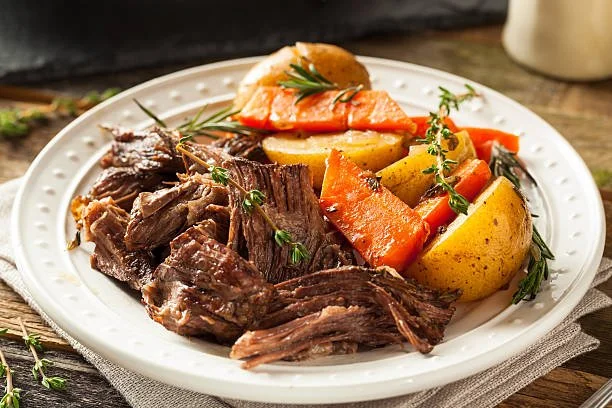Do You Cut the End Off Your Pot Roast?
Family Traditions, Boundaries, and Holiday Stress
A plate of pot roast.
I remember reading an anecdote when I was a kid, and I think about it a lot. It’s called the Pot Roast Principle, and it has completely changed the way I think about traditions, routines, and obligations. It goes something like this:
A wife makes an excellent pot roast, which her husband enjoys very much. She makes it often, but he notices that every time, she cuts off one end of the meat and throws it away. Curious, the husband asks why.
His wife replies, “This is how my mother always made it.”
The husband then asks his mother-in-law about the pot roast, and she says, “That is how my mother always made it.”
After some time, the husband finally meets his wife’s grandmother. He goes to her and says, “Grandmother, I’ve enjoyed your pot roast recipe for quite some time. It’s my favorite meal. But tell me—why do you cut the end off?”
She replies, “My roasting pan was small, so I always had to cut the end off the meat so it would fit.”
How many times in our lives have we thought something, done something, believed something, or followed something simply because:
My mom did it this way.
My dad did it like this.
My grandparents expect us to do this.
Our family has always done it this way.
My friends want it like this.
My greater community said I should.
The Pot Roast Principle is so great for reminding me to pause and ask why I’m doing what I’m doing—especially when I feel overwhelmed, resentful, or confused. It challenges me to notice when I’m on autopilot and to ask myself:
“Why am I doing this over and over, year after year, rinse and repeat?”
Is this something I really want to do, or am I doing it because that’s the way it’s always been?
Is there room to be creative?
Is there room to be flexible?
What would happen if I said no?
As the holidays approach—a season that often brings stress, family expectations, and unspoken traditions—this is a great time to apply the Pot Roast Principle. Most likely, you’ll be confronted with a task or situation that makes you feel uncomfortable. Pay attention to when you feel annoyed, frustrated, overwhelmed, or resentful—these feelings provide valuable information that you do not like what’s going on. Maybe something needs to change.
Questioning long-held routines and expectations can feel scary. Meaningful, healthy change takes courage, creativity, and flexibility. Before reacting or agreeing to something, take a deep, calming breath and ask yourself:
Why am I doing this?
Is this something I actually want to do?
Can I do it for a shorter time?
Can I do less?
Can I change it?
What would it look like if I did things differently?
If the upcoming holiday season is making you feel stuck, you’re not alone. The Pot Roast Principle challenges us to look at things differently. If you’d like support with finding balance, setting healthy boundaries, or navigating family expectations, reach out. I’m happy to help.
Leslie McReynolds is a Licensed Professional Counselor based in Flower Mound, TX. She specializes in helping people break unhelpful, unhealthy cycles of anxiety, trauma, and grief. Working with families, couples, and individuals ages adolescent and up, Leslie uses nurturing, insightful, and practical approaches to help her clients heal, grow, and transform. She is currently accepting new clients. You can find her at Flower Mound Counseling, www.flomocounseling.com, or lesliemcreynoldscounseling.com


